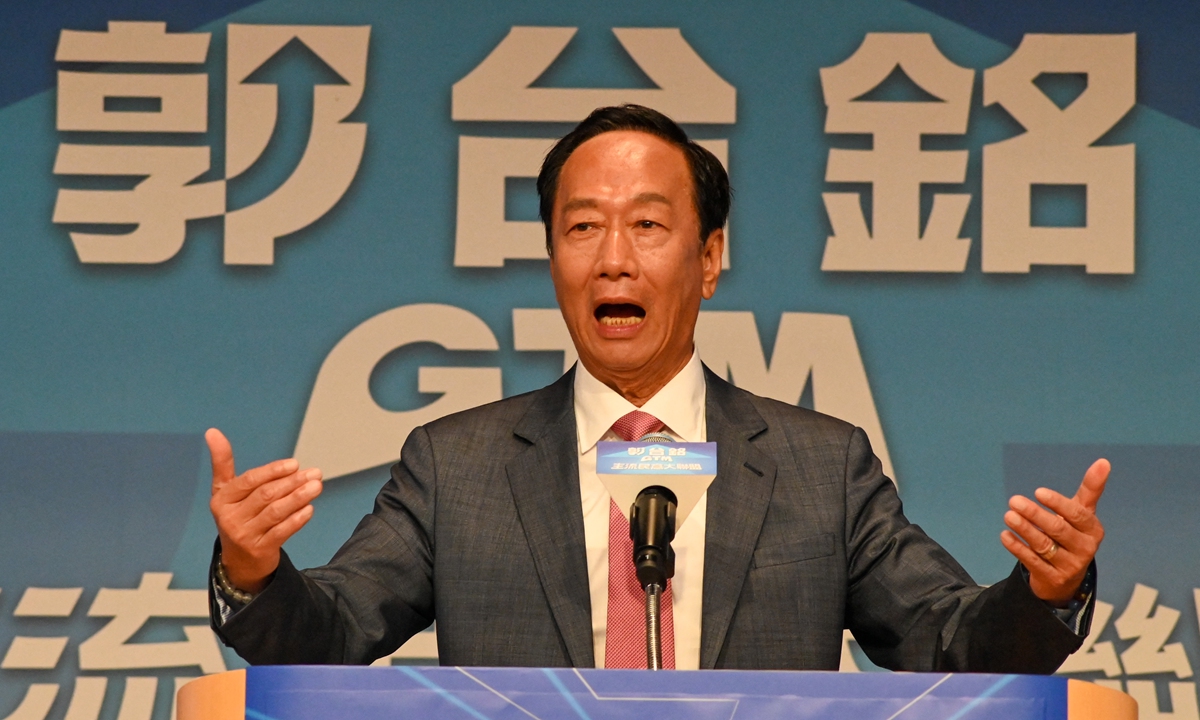
Former Foxconn Founder Terry Gou gannounced that he will run for president of Taiwan as an independent candidate on August 28, 2023.Photo: AFP
On Monday, Terry Gou announced his bid for the leadership of China's Taiwan region in 2024, stating that he can unite Taiwan's disparate opposition forces and reiterating a call for "unity" among opposition parties. However, Gou's candidacy has thrown a curve ball into the already complex political landscape of Taiwan, especially for the non-Green camp.In fact, from Gou's own announcement speech, he is well aware of the importance of uniting the non-Green camp. He mentioned this is why he proposed the initiative for a mainstream public opinion alliance at the end of July, because only by putting forth the strongest candidates can they win in the general election. However, the actual effect of Gou's announcement seems to make the uniting of the non-Green camp even more difficult. On one hand, Gou claims he wants to unite the opposition forces caught in a stalemate, but on the other hand, he positions himself as the "only entrepreneur with management ability" among the candidates who have declared their intent to run. This "it's me or no one else" attitude significantly undermines the credibility of his efforts.
Public sentiment in Taiwan actually provides hope and opportunity for uniting the non-Green camp. Current opinion polls within the island indicate that people's dissatisfaction over the Democratic Progressive Party's (DPP) governance is increasing. A poll by the Taiwan Public Opinion Foundation in May showed that 47.3 percent of respondents are tired of the DPP, surpassing the 41.7 percent who support the DPP to continue to power. Lai Ching-te's stubborn "Taiwan independence" stance has made Taiwan residents uneasy, and DPP's lackluster economic performance has led to widespread dissatisfaction, causing a significant loss of support among young voters. Several polls showed Ko Wen-je as the most popular among voters between the age of 20 and 39. If the non-Green camp can successfully present a unified front, they stand a chance to compete with Lai.
However, Gou's announcement of his candidacy will make it even more difficult for non-Green camp to integrate. The Green camp, especially the "independence faction" forces cheered, and even called on Green camp supporters to join the election campaign for Gou. Just as Lo Chih-chiang, a Kuomintang politician, pointed out: "If you don't unite, you are giving Lai the opportunity to lie flat to win." Gou's candidacy split the pan-Blue camp, which will inevitably lower the votes of Hou Yu-ih, the formal nominee of the Kuomintang. Gou's candidacy will also threaten Ko's source of votes. Those who were originally dissatisfied with the DPP and the KMT now have Gou as their second choice. If the ratio of non-Green camp to the Green camp is 6:4, then, under the three-party division of the non-Green camp Hou, Ko, and Gou, even the one with the highest votes can hardly exceed 30 percent of the votes. That "Lai just lies flat to win" does not come out of nothing.
The 2024 Taiwan regional leadership election has attracted much attention both within China and abroad, and cross-Straits relations have become one of the vital factors in the island's election campaign. Under the political maneuvering of the DPP authorities and Lai, the 2024 election is likely to become a battleground for the rivalry between those who support reunification and those who seek "independence." Meanwhile, the people of Taiwan are faced with the choice between peace and war. Most of them are looking forward to cross-Straits peace, but are skeptical about the threat of war if Lai wins the election. Candidates from the non-Green camp have promised to bring a vision of peace to the people of Taiwan, but without uniting the camp, such a promise will be difficult to realize. Only integration of the non-Green camp can bring unity, and only unity can bring the chance of winning the election.
Hoping for peace in the Taiwan Straits is the expectation of the vast majority of the people of Taiwan, and it is also the greatest common ground of the Chinese people on both sides of the Straits; our blood runs thicker than water. The most effective way to ensure cross-Straits peace is to curb the development and proliferation of the Taiwan secessionists resolutely, and the 2024 Taiwan regional leadership election is an important opportunity for a better situation in the Straits. If the non-Green camp has a clear understanding of the mainstream public opinion on the Taiwan island, they should abandon their past grudges, unite in good faith, and realize the common goal of "dismantling the DPP" through effective integration.
The author is a professor and deputy director of the Taiwan Research Institute at Xiamen University. opinion@globaltimes.com.cn

